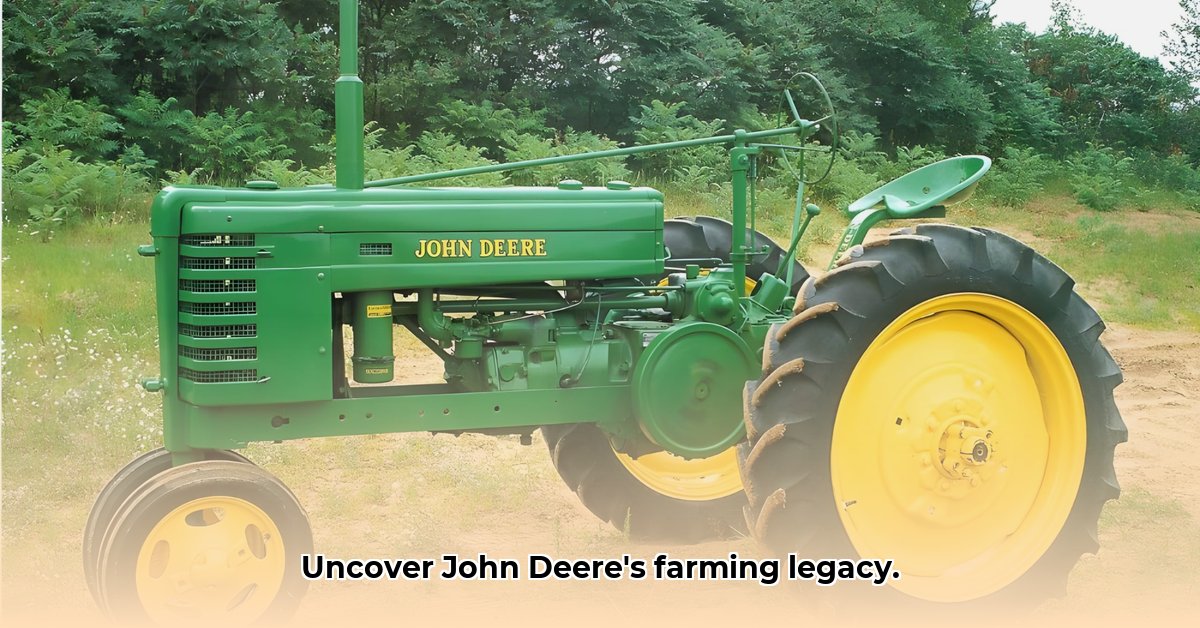
The story of John Deere antique tractors isn't just about rusty metal; it's a captivating narrative of agricultural transformation, ingenuity, and the enduring impact of human innovation on farming practices. This journey began long before roaring engines, in 1837, with a simple yet revolutionary invention: the steel plow. Before John Deere's innovation, farmers wrestled with inefficient cast iron plows, a testament to the back-breaking labor of the time. His steel plow, with its smooth cut, redefined efficiency, dramatically altering the agricultural landscape. For more on vintage models, see this great resource.
This wasn't a linear path to success, however. John Deere's evolution was marked by bold decisions and clever adaptations to emerging technologies. The late 19th and early 20th centuries witnessed a seismic shift: the rise of the internal combustion engine. Tractors replaced horses, granting farmers an unprecedented level of control over their land and crops.
The Waterloo Boy gasoline tractor stands out as a pivotal moment. It unleashed a previously unimaginable level of horsepower, accelerating fieldwork and boosting harvest yields. This wasn't merely a technological advancement; it was a societal revolution, reshaping rural life and communities across the nation.
But the story continued to unfold. Diesel engines emerged, enhancing fuel efficiency. Subsequent innovations, including electric starters, live power take-offs (PTOs – used to power implements like hay balers), and four-wheel drive, further increased tractor power and versatility. Each advancement built upon the last, creating a lineage of machines that redefined modern farming.
These early John Deere tractors are more than just antique farm equipment; they are highly sought-after collector's items, painstakingly restored by passionate enthusiasts. Their value transcends mere monetary worth; they represent tangible pieces of history, embodying the ingenuity and dedication that shaped our food supply.
However, the impact of John Deere extended far beyond the machines themselves. The increased productivity undeniably yielded more food. But what about the other, less apparent consequences? How did mechanization affect farm labor and the environment? These are crucial questions demanding careful examination.
The mechanization spurred by John Deere led to more abundant food production. But this efficiency also meant a decreased demand for farm labor, significantly impacting rural communities and forcing many to seek new livelihoods. Furthermore, the increased use of machinery, fertilizers, and pesticides, while boosting yields, raised concerns about long-term environmental sustainability. Ongoing research strives to understand the trade-offs between increased food production and the planet's well-being. Many experts believe a sustainable balance can be achieved through improved farming techniques, although the precise methods remain a subject of continuous debate.
How John Deere Tractors Impact Sustainable Farming Practices
Key Takeaways:
- John Deere tractors revolutionized farm productivity and efficiency.
- Technological advancements like GPS guidance and remote monitoring significantly increased yields.
- However, the long-term environmental consequences of tractor use require further investigation.
- Sustainable agriculture necessitates a balanced approach, employing John Deere technology responsibly alongside other methods.
- The future of sustainable farming depends on optimizing tractor use and mitigating potential environmental harm.
A Century of Green: How John Deere Shaped Modern Farming
John Deere's iconic green and yellow are globally synonymous with farming. But how have these machines shaped sustainable farming practices? The answer lies in a narrative of continuous innovation, efficiency improvements, and a growing awareness of environmental responsibility.
Early Deere tractors, while impressive feats of engineering, primarily focused on sheer power. They enabled farmers to cultivate larger areas, boosting yields. However, this early era wasn't without environmental costs. Deep plowing, for instance, could lead to soil erosion and depletion. The scale of mechanized farming also raised concerns about habitat loss and biodiversity.
The Precision Revolution: Technology's Double-Edged Sword
The mid-20th century marked a crucial turning point. John Deere's innovations accelerated, leading to remarkable advancements in precision agriculture. AutoTrac GPS guidance systems transformed fieldwork, minimizing overlaps and reducing fuel waste. JDLink's remote monitoring capabilities enabled farmers to track tractor performance, optimizing efficiency and reducing unnecessary field trips. These advancements yielded significant environmental benefits – less fuel consumption translates to fewer emissions, and precise maneuvering minimizes soil compaction, leading to healthier soil. However, the inherent complexities persist. Do these benefits outweigh the manufacturing and disposal costs of increasingly complex machinery?
The Sustainability Challenge: Balancing Progress and Preservation
This question lies at the heart of the modern discussion. The impact of John Deere tractors on sustainable farming is undeniably multifaceted. While boosting efficiency, these machines still largely rely on fossil fuels, presenting a significant environmental hurdle. Moreover, the high purchase and maintenance costs create barriers for smaller farms, potentially exacerbating inequalities within the agricultural sector. We must therefore ask: Does the increased yield justify the environmental footprint, and how can we ensure equitable access for all farmers?
Looking Ahead: The Path to a Greener Future
The future of sustainable agriculture demands a comprehensive approach. Investing in fuel-efficient models and exploring alternative fuels like biofuels and electric power is paramount. Farmers require access to incentives and training to fully utilize precision agriculture technologies responsibly. Governmental support for sustainable practices and policies promoting resource conservation are crucial. A collaborative effort between manufacturers like John Deere, policymakers, and farmers themselves is essential for navigating these challenges and fostering sustainable agricultural practices.